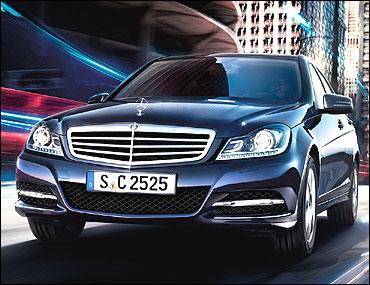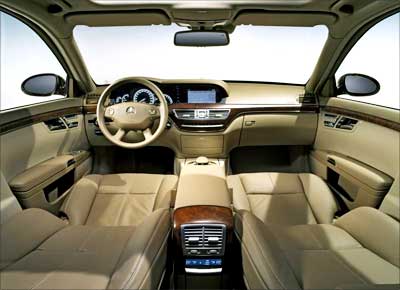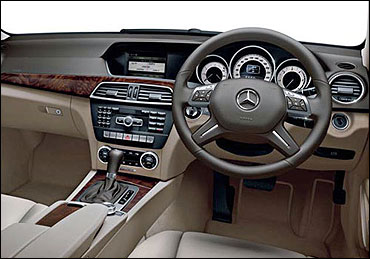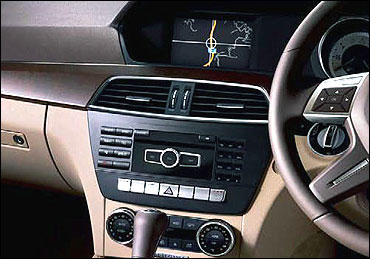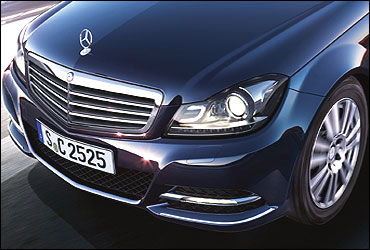 | « Back to article | Print this article |
Now, leasing a Merc is cheaper than buying
Dream of owning a Mercedes but bogged down by the thought of down payment and equated monthly installments?
Here's one for you: Mercedes Benz Financial, the financing arm of the car maker, is now offering Mercs on lease.
According to Siddharth Nair, MD, Daimler Financial Services, the current owners of Mercedes cars, typically, rotate their cars every three-four years.
Since a car can last around seven to 10 years, such users are effectively paying a lot more and would probably be better off leasing a vehicle instead of buying it.
A lease tenure lasts around 36 to 48 months (three to four years).
A fixed annual kilometre run is also determined, 15,000 kilometres.
Click NEXT to read further. . .
Now, leasing a Merc is cheaper than buying
If you exceed this limit, there will be an additional charge.
This is how it works: Once you choose the model, the company would calculate its future value (at the end of the tenure) at the onset.
A rental amount would be calculated based on this value.
This is the amount you pay every month.
The rental also includes other costs like insurance, maintenance charges and registration.
If you take a loan, you are required to pay all these charges upfront, in addition to a down payment of 20 to 25 per cent.
Click NEXT to read further. . .
Now, leasing a Merc is cheaper than buying
So, say, you bought a C-class Merc model for around Rs 30 lakhs (Rs 3 million), you would have to shell out at least Rs 800,000-10 lakhs (Rs 1 million) upfront.
However, the Star Lease product allows you the flexibility of choosing to lease the car at zero down payment.
"We provide ample flexibility to clients. They can choose to make no down payment or even partly," says Nair.
So, instead of Rs 10 lakhs (Rs 1 million), you may choose to just pay a lump sum amount of your choice.
Making a down payment may help you though, as your monthly rentals go down.
Click NEXT to read further. . .
Now, leasing a Merc is cheaper than buying
If one were to compare the purchase of a car through EMIs vis-a-vis leasing, the numbers are not glaringly different in terms of monthly outgo.
However, calculated over a period, there may be a definite saving.
For instance, if you consider the lease option without down payment and the loan option, over a three-year period, you can save around Rs 300,000 in monthly outgo.
Suppose you are keen on buying a Merc, but the monthly outgo of around Rs 100,000 in either of the cases is too high for you, maybe you can consider purchasing the car and servicing the loan over a seven-year period.
Click NEXT to read further. . .
Now, leasing a Merc is cheaper than buying
The most important advantage of leasing comes at the end of the lease tenure, when you can simply return your car and possibly drive out with another car.
You don't have to worry about haggling with a buyer, trying to sell off a second hand car. The only cause to worry is, if the car is not in an appropriate condition. In that case, you may have to shell out additional money.
There is also the option of buying the car after the lease ends.
Click NEXT to read further. . .
Now, leasing a Merc is cheaper than buying
However, it is not recommended, as you may pay a lot more cumulatively than the price of the car.
Car leasing is also often preferred by individuals due to the taxation benefits, feels Rahul Maroli, general manager (commercial), LeasePlan, a car leasing company.
A car purchase allows one to claim depreciation benefits.
The leasing expenses though can be considered a deduction by businessmen and professionals, helping save up to 30 per cent for those in the highest tax bracket.
Click NEXT to read further. . .
Now, leasing a Merc is cheaper than buying
There are no tax benefits for salaried individuals, either for purchases on loan or leases.
Little wonder then that the maximum enquiries and operating leases signed by Mercedes Benz have been either from individual businessmen and small and medium enterprises or expats, who are on temporary deputation in India.
As per Maroli, the option of car leasing has not gained traction in India, as there is no way for car leasing companies to assess the credit worthiness of the customer.
However, this is not a problem that Mercedes Benz Financial is likely to face as it is a registered non-banking finance company and can therefore access one's credit scores, and as Nair says, almost making instantaneous leasing possible.
